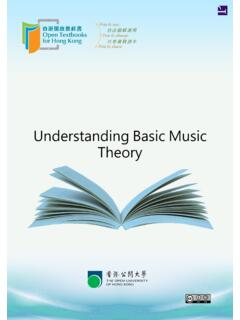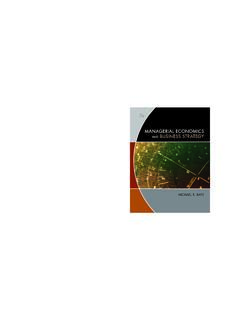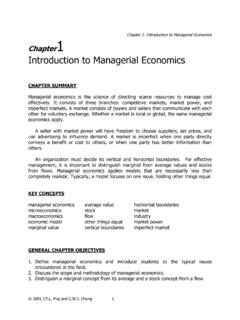Transcription of Principles of Managerial Economics - opentextbooks.org.hk
1 Principles of ManagerialEconomicsThis work is licensed under a Creative Commons-NonCommercial-ShareAlike International LicenseOriginal source:The Saylor 1 Introduction to Managerial What Is Managerial Economics ?.. Why Managerial Economics Is Relevant for Managerial Economics Is Applicable to Different Types of The Focus of This How to Read This 2 Key Measures and A Simple Business Revenue, Cost, and economic Versus Accounting Measures of Cost and Revenue, Cost, and Profit Breakeven The Impact of Price Marginal The Conclusion for Our The Shutdown A Final Word on Business 3 Demand and Theory of the Is the Theory of the Consumer Realistic?
2 Determinants of Modeling Consumer Forecasting Elasticity of Consumption Decisions in the Short Run and the Long Price 4 Cost and Average Cost Long-Run Average Cost and Economies of Scope and Joint Cost Approach Versus Resource Approach to Production Marginal Revenue Product and Derived Marginal Cost of Inputs and economic Productivity and the Learning 5 Economics of Reasons to Expand an Classifying Business Expansion in Terms of Value Horizontal Vertical Alternatives to Vertical Transaction
3 Costs and Boundaries of the Cost Centers Versus Profit Transfer Employee Manager Motivation and Executive 6 Market Equilibrium and the Perfect Competition Assumptions of the Perfect Competition Operation of a Perfectly Competitive Market in the Short Perfect Competition in the Long Firm Supply Curves and Market Supply Market Shifts in Supply and Demand Why Perfect Competition Is Monopolistic Contestable Market Firm Strategies in Highly Competitive 7 Firm Competition and Market Why Perfect Competition Usually Does Not Oligopoly and Production Decisions in Noncartel Seller Competing in Tight Oligopolies: Pricing Competing in Tight Oligopolies.
4 Nonpricing Buyer 8 Market Free Market Economies Versus Collectivist Efficiency and Circumstances in Which Market Regulation May Be Regulation to Offset Market Power of Sellers or Natural Externality Regulation of Externalities Through Property High Cost to Initial Entrant and the Risk of Free Rider Public Goods and the Risk of Free Rider Market Failure Caused by Imperfect Limitations of Market 1 Introduction to What Is Managerial Economics ?Available underCreative Commons-NonCommercial-ShareAlike International License( ).
5 One standard definition for Economics is the study of the production, distribution, andconsumption of goods and services. A second definition is the study of choice relatedto the allocation of scarce resources. The first definition indicates that economicsincludes any business, nonprofit organization, or administrative unit. The seconddefinition establishes that Economics is at the core of what managers of theseorganizations do. This book presents economic concepts and Principles from theperspective of Managerial Economics , which is a subfield of Economics that placesspecial emphasis on the choice aspect in the second definition.
6 The purpose ofmanagerial Economics is to provide economic terminology and reasoning for theimprovement of Managerial decisions. Most readers will be familiar with two differentconceptual approaches to the study of Economics : microeconomics andmacroeconomics. Microeconomics studies phenomena related to goods and servicesfrom the perspective of individual decision-making entities that is, households andbusinesses. Macroeconomics approaches the same phenomena at an aggregate level,for example, the total consumption and production of a region.
7 Microeconomics andmacroeconomics each have their merits. The microeconomic approach is essential forunderstanding the behavior of atomic entities in an economy. However,understanding the systematic interaction of the many households and businesseswould be too complex to derive from descriptions of the individual units. Themacroeconomic approach provides measures and theories to understand the overallsystematic behavior of an economy. Since the purpose of Managerial Economics is toapply Economics for the improvement of Managerial decisions in an organization,most of the subject material in Managerial Economics has a microeconomic , since managers must consider the state of their environment in makingdecisions and the environment includes the overall economy.
8 An understanding ofhow to interpret and forecast macroeconomic measures is useful in makingmanagerial Why Managerial Economics Is Relevant for ManagersAvailable underCreative Commons-NonCommercial-ShareAlike International License( ).In a civilized society, we rely on others in the society to produce and distribute nearlyall the goods and services we need. However, the sources of those goods and servicesare usually not other individuals but organizations created for the explicit purpose ofproducing and distributing goods and services.
9 Nearly every organization in our1society whether it is a business, nonprofit entity, or governmental unit can beviewed as providing a set of goods, services, or both. The responsibility for overseeingand making decisions for these organizations is the role of executives and readers will readily acknowledge that the subject matter of Economics applies totheir organizations and to their roles as managers. However, some readers mayquestion whether their own understanding of Economics is essential, just as they mayrecognize that physical sciences like chemistry and physics are at work in their livesbut have determined they can function successfully without a deep understanding ofthose subjects.
10 Whether or not the readers are skeptical about the need to study andunderstand Economics per se, most will recognize the value of studying appliedbusiness disciplines like marketing, production/operations management, finance, andbusiness strategy. These subjects form the core of the curriculum for most academicbusiness and management programs, and most managers can readily describe theirrole in their organization in terms of one or more of these applied subjects. A carefulexamination of the literature for any of these subjects will reveal that economicsprovides key terminology and a theoretical foundation.









